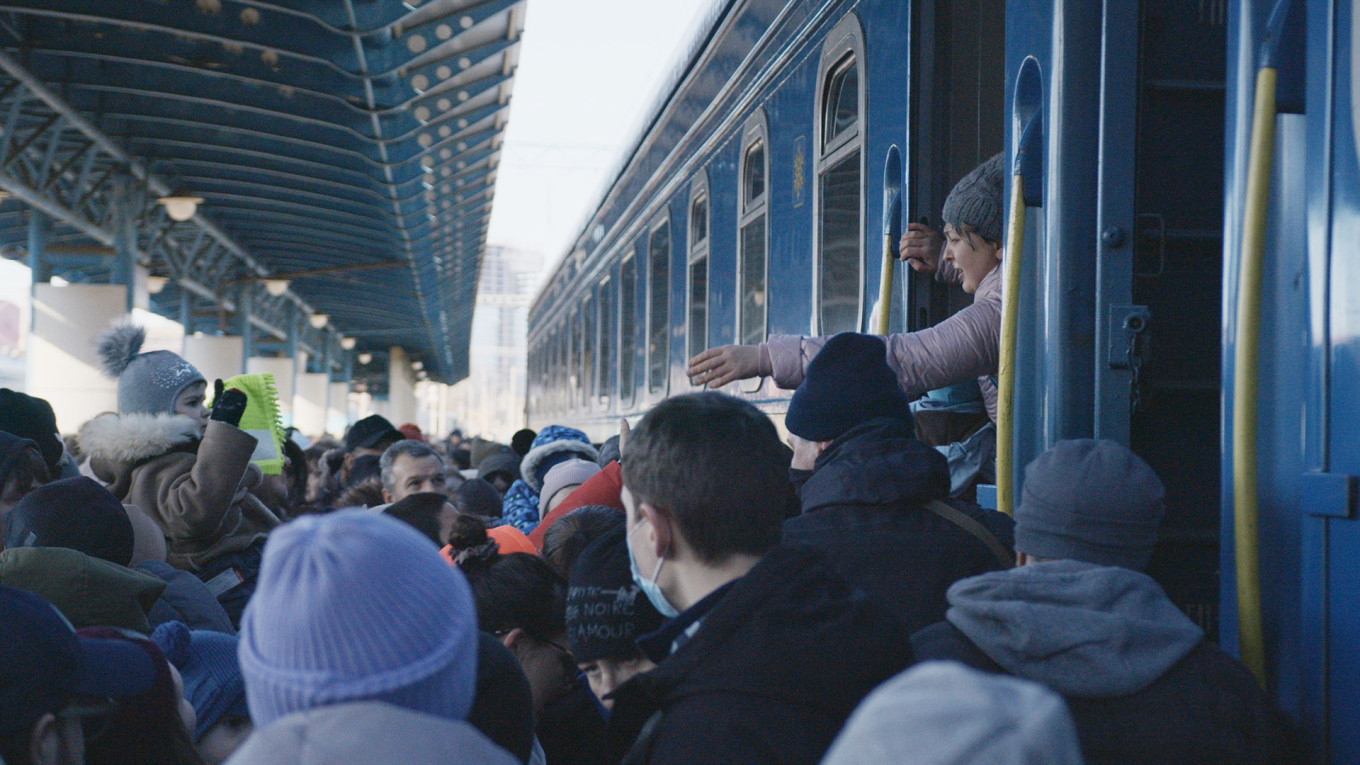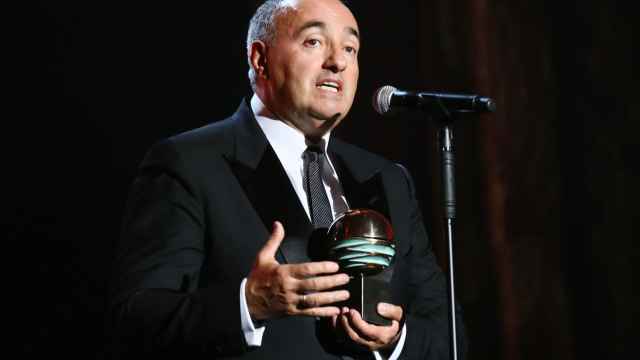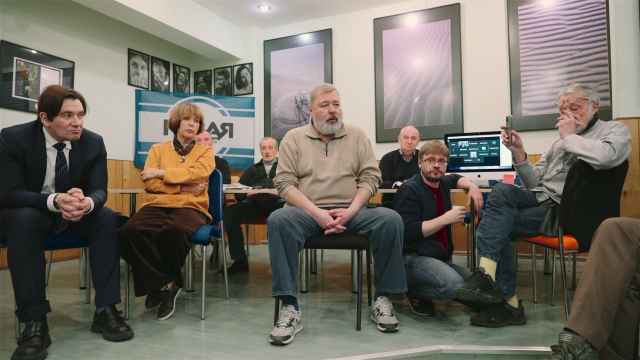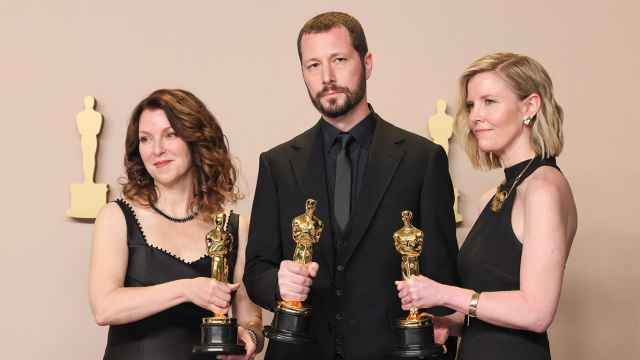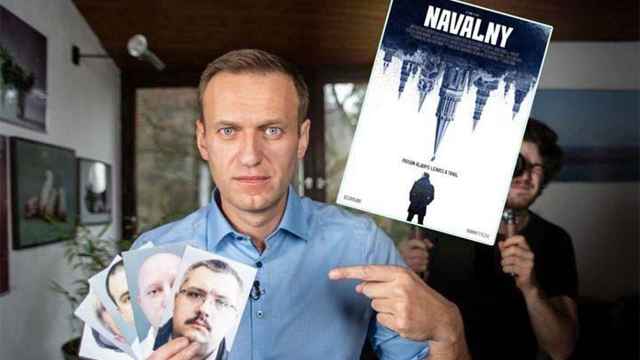A new set of documentaries about Russia’s attack on Ukraine and its reverberations in Europe have hit cinemas at a pivotal moment in U.S. support for Ukraine.
Audiences at the annual International Documentary Film Festival Amsterdam (IDFA), the 10-day festival in the Netherlands that runs through Nov. 24, have the opportunity to see several eyewitness accounts of everyday life in wartime Ukraine.
“The Invasion,” directed by Sergei Loznitsa, the filmmaker behind the 2014 documentary “Maidan,” includes contrasting scenes of a Ukraine military funeral procession, rescue workers searching for survivors in a destroyed apartment building, and a happy wedding — suggesting resilience and the continuation of life, despite the ongoing fighting.
Another, “Songs of Slow Burning Earth,” includes scenes from a morgue and the identification of fallen soldiers, a solitary boy passionately playing “war,” and stressful train evacuations from Kyiv. The film ends with a group of schoolchildren in Russia practicing traditional marching.
Olha Zhurba, the film’s writer and director, said she is often asked if any of the scenes were staged.
“Unfortunately, all the scenes are our own reality,” she said in a video address to the festival audience. Regarding the final scene of the children’s drill routines, Zhurba said: “I wanted to make a warning. They are preparing for future wars‚ even if Putin dies.”
In “Intercepted,” directed by the Ukrainian-Canadian filmmaker Oksana Karpovych, scenes of devastation in Ukraine are juxtaposed against a soundtrack of cell phone calls intercepted by Ukrainian intelligence between Russian soldiers at the front and their loved ones. The conversations contrast the often vast differences between what soldiers see of Ukraine with what those at home know about the situation through state-controlled media.
Another selection, Oleh Sentsov's “Real,” is a single continuous shot of raw footage taken inadvertently by a GoPro camera mounted on Sentsov's helmet in the trenches. Sentsov said he found the 90 minutes of footage later. Only the film’s sound was altered to make it a more immersive experience.
“It’s a complete accident that this movie even happened,” Sentsov told the audience after the screening. Sentsov was imprisoned in Russia for terrorism charges widely seen as fake, and released in 2019 after five years of imprisonment as part of a prisoner exchange between Russia and Ukraine. In 2022, Sentsov, an ethnic Russian born in Crimea, enlisted with Ukrainian forces.
“All Is Well” is a lens into everyday life at a shelter for Ukrainian refugees in the Dutch town of Weesp. “Dear Beautiful Beloved” focuses on humanitarian relief networks that assist Ukrainian civilians affected by the war.
A year ago, Ukrainian filmmakers and human rights activists chastized the festival’s organizers for showing Ilya Povolotsky’s “Mud,” which depicts Russians at a restorative health spa who seem apathetic to the ongoing conflict in Ukraine. IDFA responded by saying it would not accept film submissions associated with the Russian government or oligarch allies, or ones that echoed official state narratives that justified the war, industry newsletter Screen International reported in November 2023.
This year, Russian films were once again absent from the IDFA program, except for a screening of "Spiritual Voices,” the five-hour 1995 epic directed by Alexander Sokurov about guards on the border between Tajikistan and Afghanistan. Sokurov embedded himself with a regiment of fresh-faced recruits who were bored and homesick amid the tedium of life in the inhospitable mountainous terrain.
Although not a Russian-language film, the festival paid homage to “The Color of Pomegranates” through a special screening of the newly restored 1969 film about the life of the 18th-century Armenian poet Sayat-Nova. The film, directed by Sergei Parajanov, was shown alongside two related documentaries about Parajanov and Armenia, both by filmmaker Mikhail Vartanov.
A Message from The Moscow Times:
Dear readers,
We are facing unprecedented challenges. Russia's Prosecutor General's Office has designated The Moscow Times as an "undesirable" organization, criminalizing our work and putting our staff at risk of prosecution. This follows our earlier unjust labeling as a "foreign agent."
These actions are direct attempts to silence independent journalism in Russia. The authorities claim our work "discredits the decisions of the Russian leadership." We see things differently: we strive to provide accurate, unbiased reporting on Russia.
We, the journalists of The Moscow Times, refuse to be silenced. But to continue our work, we need your help.
Your support, no matter how small, makes a world of difference. If you can, please support us monthly starting from just $2. It's quick to set up, and every contribution makes a significant impact.
By supporting The Moscow Times, you're defending open, independent journalism in the face of repression. Thank you for standing with us.
Remind me later.


